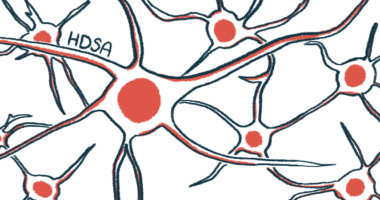Researchers Identify Markers to Track Huntington’s Years Before Signs of Disease

Researchers found biomarkers — molecules with elevated levels — in people who carry the Huntington’s disease (HD) gene who have not yet shown symptoms of the disease. These markers may allow for the testing of new treatments before the onset of Huntington’s in susceptible individuals.
The study, “MicroRNAs in CSF as prodromal biomarkers for Huntington disease in the PREDICT-HD study,” was published in the journal Neurology.
The study reports on the results of the clinical trial PREDICT-HD (NCT00051324) that examined potential biological markers of Huntington’s disease in 60 adult Huntington’s gene carriers who had not yet developed the disease.
Huntington’s disease symptoms typically manifest between the ages of 30 and 50 in people who have the genetic defect that causes it.
The researchers at Boston University School of Medicine (BUSM) looked for molecules called microRNAs (substances in the body that modulate the activity of specific genes) in the cerebrospinal fluid (CSF) of people with the Huntington’s mutation and in healthy controls. CSF is the fluid that bathes the brain and the spinal cord, and is typically collected using a procedure called a lumbar puncture.
Of the 2,081 microRNAs identified, six were found to gradually increase in the CSF of individuals as the expected time of onset of symptoms approached. Altered levels of a microRNA were found in people as long as 20 years before symptoms were expected to occur.
Because the levels of the six microRNAs increased as the risk of developing symptoms rose, the researchers suggest that treatments that reduce the levels of these microRNAs may delay the onset of disease. Also, trials of these therapies could possibly be done in HD gene carriers before they become ill.
“The most interesting finding was that the levels of the microRNAs begin to increase many years before the individual shows symptoms and continue to increase as disease onset approaches,” corresponding author Richard H. Myers, PhD, professor of neurology and director of the Genome Science Institute at BUSM, said in a press release.
“Clinical trials for new HD treatments that may reduce the levels of the microRNAs suggest that these treatments may postpone the onset of the disease,” he said.
“By evaluating microRNAs in the CSF, it may become feasible to perform these trials in people who are HD gene carriers, but who do not yet show symptoms, by giving evidence for which trials may postpone onset and provide more healthy years of life,” Myers added.
The research was funded by the National Institutes of Health, the Jerry McDonald Huntington Disease Research Fund, and the National Institute of Neurological Disorders and Stroke.






